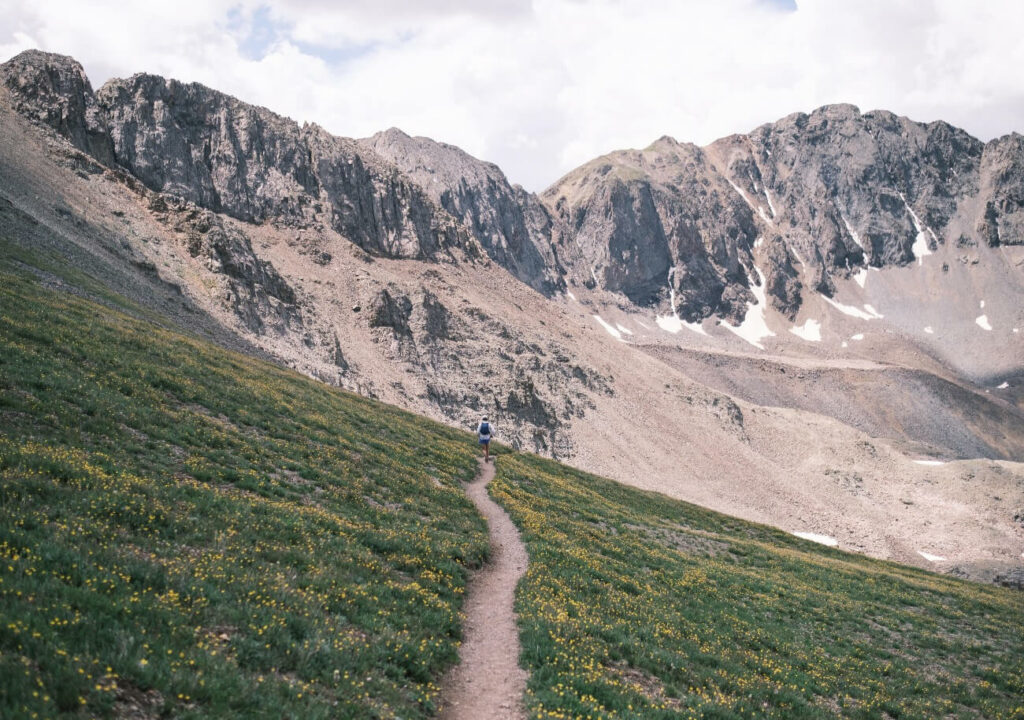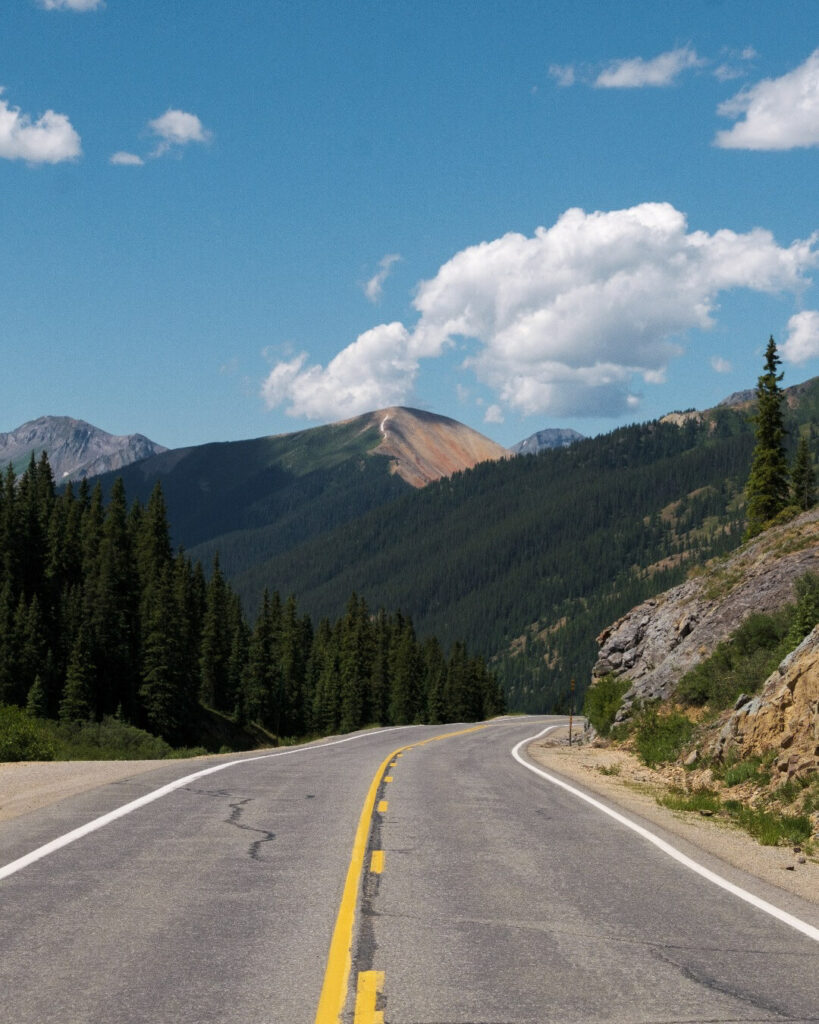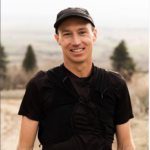Editors note: This is the second in a series of articles from Dakota Jones that will examine the intersection of environmentalism and the trail and ultrarunning community. Each piece will tell a story through personal reflection as Dakota highlights the progress and the mistakes he’s made along the way, including the incredible work that he is doing with Footprints Running – an incubator for climate action. You can read the first article here.
When I was a kid I really liked trains. My mom and I would go to the train tracks a few miles from our house just to watch the train go by and see if we could count all the cars. Naturally, I decided that when I grew up, I would drive trains, and when I asked my mom about it one day, she told me that train drivers were called engineers. So it was decided: I would be an engineer when I grew up.
My dad was a different type of engineer. In 1978 he earned his degree in chemical engineering and immediately went to work in the West Texas oil fields. He had a passion for his work that came from the deep fulfillment he felt at overcoming the many challenges inherent in oil and gas processing. This is the source of energy that fueled – that still fuels – our society, and what could be more rewarding than problem solving for the good of the world? At dinner he often shared details of what he was doing and how it worked while the rest of the family rolled our eyes in boredom. Dad, nobody cares about sulfur recovery.
But I clearly remember telling him I wanted to be an engineer when I was about four years old, and seeing his eyes light up. Even as a four-year-old, I was aware that there seemed to be a difference between what I found interesting and what my dad found interesting, and so it gave me a thrill to see that my interest in becoming an engineer seemed to captivate my dad’s true interest in a way that nothing else I did seemed to. But then came a moment of confusion.
“What kind of engineer do you want to be?” he asked.
I stared at him blankly. What do you mean, what kind of engineer? I want to drive f%&*ing trains, Dad, what the hell else would I do? I didn’t know what to say. There was a brief awkward moment and then my mom stepped in and explained that I didn’t want to process oil or build airplanes or whatever; I wanted to drive trains. That’s when my dad’s interest faded to what I normally received, and I guess that’s how I learned that there are different types of engineering.
The heartbreak of that story is that my dad never got to see me come around to a type of engineering he understood: I am actually now in school for mechanical engineering. It would have meant so much to both of us to share this. But before I could find this goal that surely, deep down, stems from him, I had to run super far on trails a lot. That was okay with him too, though. As kids, every night before bed he told my sister and I “you can do anything you set your mind to.” He said that every night. Regardless of the paths I’ve taken, nothing has shaped my way of thinking about goals as much as that sentence, told to me by my dad throughout my childhood.
In 2020 I started an organization called Footprints Running that helps trail runners take action against climate change. The momentum Footprints gained right away was directly attributable to my platform as a professional runner: because people knew me (and the more-famous people I knew who agreed to help), they were willing to give my foundation a chance. There’s a distinct irony in all of this. I was able to become a professional runner in the first place because I had a safety net out of high school; I was able to devote tremendous amounts of time and energy to trail running without fear of burning out in life because my parents are well off and support everything I do. But they are well off in large part because of my dad’s three-decade career in the fossil fuel industry.
In July 2008, my dad and I spent two weeks camping in the San Juan mountains of southwestern Colorado. Have you been there? It’s a steep landscape defined by ancient ice sheets, with an average elevation above 11,000 feet. But for all its harshness, it’s surprisingly soft too. The cold morning air gives way to quick warmth as the sun rises. The grey rocks – remnants of some of the planet’s largest-ever volcanic explosions – are often peppered with wildflowers of all colors of the rainbow. The aspen and pine forests create glades that protect you from the high-altitude sun and the furious storms that come out of nowhere each summer afternoon. I was seventeen and my dad had been dealing with lymphoma for eight years.

When you went hiking with my dad, you went prepared: our packs were stocked with everything you could need for at least two days of camping and enough supplies to survive in the backcountry for several more. We also took on a mountaineer’s schedule, meaning we were hiking each morning well before dawn, in order to climb to the day’s objective and descend by early afternoon, when the storms always hit. In the San Juans, you can set your clocks by the afternoon thunderstorms.
There came a day when I looked at the route we were planning and thought, hey, if I go right at this spot, I can climb this other peak too and then meet Dad at the lake. He thought that was a cool idea too and the next day I did that: a few miles into the hike I went up one road and he and the dog went up another. The dog was a labrador and didn’t like this at all. She went back and forth frantically until my Dad finally had to hold her still until I disappeared around the next bend. A few hours later I stood on the top of a peak alone and looked down at the route my Dad was taking, feeling a mixture of pride and melancholy.
That started us on a new routine. Each day thereafter, we planned dual routes: my dad would climb one peak, and I’d go off on a different vector to climb several others. We always met back at the truck by early afternoon and shared lunch in the camper as the rain fell on the alpine tundra. The dog’s discomfort with our parting each morning was not entirely erased by her pleasure at our reunion each afternoon. But we did it anyway. It felt inevitable. And I was excited because a switch had been turned on in my brain: no longer was I just out in the mountains with my dad because that’s what we did. Now I was more capable than I’d ever been before – more capable than my dad even, somehow – and the potential for exploration and adventure in this alpine world felt limitless. Where could I go next?
These days I spend at least half of my professional life working to dismantle the oil and gas industry that my dad spent his whole professional life contributing to. I’m working against the industry that supported my family over two decades as we grew up. It may seem a bit ungrateful and more than a little hypocritical. But it’s similar to what happened at the end of our San Juans trip in 2008. That was the first time I ever volunteered at the Hardrock 100, when with a handful of students from Silverton High School (most of them, probably), I hiked into an aid station situated at treeline with enough supplies to feed and water 150 runners through the night. My dad took a jeeping tour in Ouray and I stayed up all night learning that I didn’t need to take a big pack and I didn’t even have to walk in the mountains. I specifically remember Kyle Skaggs coming through the aid station in mid-afternoon – 50 miles into the biggest mountain race I’d ever heard of – wearing a singlet and shorts and carrying one water bottle and then literally running up the mountain as he left. By the end of that summer I had ditched the backpack and was mountain running in the San Juans just like my new idols at Hardrock. My dad and I didn’t go camping much after that. I took what I’d learned from him and went in a different direction.
A few short years later I was running eight ultras a year, getting free gear and even some money, and taking every opportunity to travel around the country and world to run in mountains. I dreamed of being like Kyle Skaggs without fully understanding that my mountain values and goals had been given to me by my dad. The irony of developing a lifestyle devoted to wild places that was based on an energy system that destroys those places was not lost on me, but I couldn’t say no to those opportunities. Sometime I’ll tell you more about how I tried to first justify and later address this contradiction. But now I know it is impossible to live in the world today without using fossil fuels; even those of us who work to move our energy sources to renewables are faced with that reality. And since our energy currently comes from fossil fuels, we’re in the ironic situation where we have to use fossil fuels in order to get away from them. With the right planning and implementation, we can use fewer of them, but the general paradox of this situation reflects the personal paradoxes we all face.
I can’t imagine the struggle parents face when their children, who were once small and bubbly and utterly dependent on them for every single thing, grow up to lead their own lives and disagree with you and forget to call home. It must take a level of humility and grace that those of us without children can’t yet imagine. But how much humility and grace must be required to watch yourself fall apart physically and have to ask your children for help? When your body begins to fail for reasons that only make theoretical sense while in the real world you just can’t do anything and you don’t have any energy and you become utterly reliant on others. I won’t tell you about watching my dad go through his sickness, because that pain is my own and my family’s.
You can do anything you set your mind to. He meant that I could climb mountains and work hard and lead a fulfilling life dedicated to family and purpose. I doubt he ever meant it to mean I could find the strength to watch him slowly die. Without my mom and my sister and my friends by my side, I couldn’t have. But I helped him in the feeble ways I could and that’s the best any of us could do.
Still, when I work on making Footprints a meaningful force pushing the world away from fossil fuels, I’m working in the same spirit as my dad. We would have had some hard conversations, but he would have understood the passion with which I undertake this work because that’s what he taught me: it’s not about what you do, but about how you do it. I came to this work because he showed me the mountains and taught me what they could mean, and that has resonated with me to such an extent that it’s now worth working against my dad in some respect. Still, I wish I could explain it to him. To say thank you and I’m sorry all at once.

The point of this story is to highlight the multi-dimensionality we all embody. Nobody is entirely one thing or another, and we’re all full of contradictions that make us so much more dynamic than any description could capture. Compassion and empathy are the only ways to move us forward, even – especially – in the face of the biggest ecological crisis humans have ever faced. It’s possible there are some Mr. Burns types in the highest corner offices of the oil companies counting their money and scheming for more. But the overwhelming majority of the people working in oil and gas are hardworking, intelligent, and principled folk whose main goals are to support their families and live good lives. They raise their children to be good people in their own ways. Demonizing them hurts everyone.
I don’t know how to tell these stories in a coherent way. I don’t know how to share the love I feel for people everywhere and also acknowledge that some things some people do are very bad. I want people who see me talking about climate change to know how much I loved my dad the oil man because then they might see the real contradiction inside of all of us: it’s not that we want to stop climate change but we still drive cars; it’s that we try to protect people in ways that hurt them.
